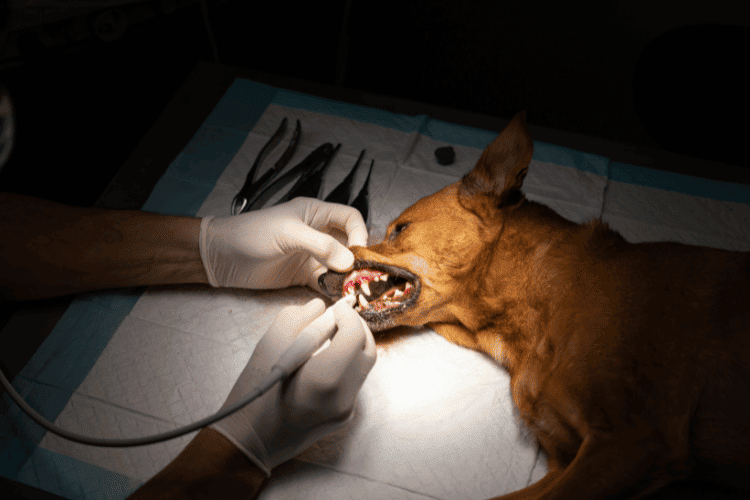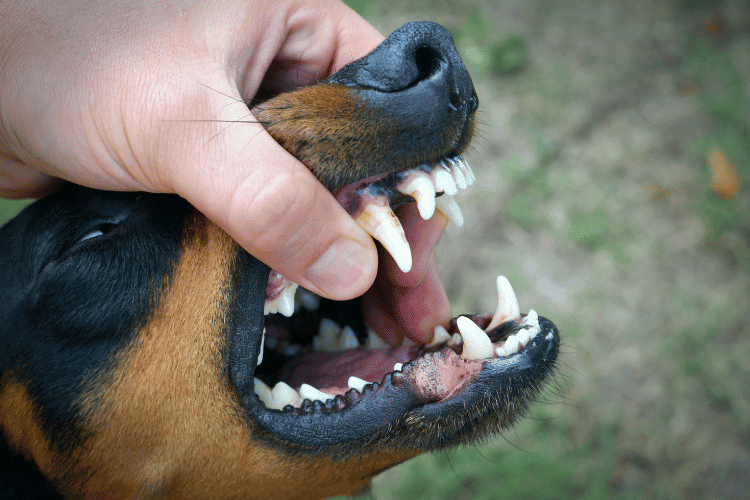Just like humans, dogs are susceptible to dental disease, which can cause discomfort and affect their overall health. Dental problems in dogs can range from mild plaque buildup to more severe conditions like periodontal disease. As responsible pet owners, it’s important to understand the basics of Dogs Dental Disease, including its causes, signs, and potential consequences. In this blog, we will provide you with a simple guide to help you better understand Dog Dental Disease.
Causes of Dogs Dental Disease:
Dogs Dental Disease typically begins with the formation of plaque, a sticky film composed of bacteria, saliva, and food particles that accumulates on teeth. If not removed, plaque hardens into tartar, which can irritate the gums and lead to inflammation and infection. Poor dental hygiene, inadequate nutrition, genetics, and certain medical conditions can contribute to the development of dental disease in dogs. Dental disease is a prevalent condition in dogs that can cause discomfort and affect their overall health. As responsible pet owners, it’s essential to understand the causes of dental disease in dogs. By identifying the factors that contribute to dental problems, we can take proactive steps to prevent them and ensure our furry friends have healthy smiles.
Poor Dogs Dental Disease Hygiene:
Inadequate dental care and poor oral hygiene play a significant role in the development of Dogs Dental Disease. Without regular brushing, plaque and tartar can accumulate, causing gum inflammation (gingivitis) and leading to more severe conditions like periodontal disease. Lack of proper dental care allows harmful bacteria to thrive, contributing to the progression of dental disease.
Dog Dental Diseases cause Genetic Factors:
Genetics can also influence of Dogs Dental Disease. Some breeds may have a predisposition to certain dental issues due to their genetic makeup. For example, smaller dog breeds may have overcrowded teeth or misalignment, making them more prone to plaque and tartar buildup.
Poor Diet cause Dog Dental Diseases:
Diet plays a crucial role in maintaining a dog’s dental health. Feeding your dog an poor diet that not supports their overall well-being cannot help the prevent dental disease. Certain types of food, such as soft or sticky treats, can adhere to the teeth and promote plaque formation. On the other hand, dry dog food or specially formulated dental diets can help clean the teeth and reduce plaque buildup.
Plaque and Tartar Dogs Dental Disease:
The primary cause of Dog Dental Disease is the buildup of plaque and tartar on their teeth. Plaque is a sticky film composed of bacteria, saliva, and food particles that accumulate on the teeth’s surface. Over time, if not removed, plaque hardens into tartar (also known as calculus), which adheres tightly to the teeth. Plaque and tartar provide a breeding ground for bacteria, leading to inflammation, infection, and other dental issues.

Age and Lack of Dental Care:
As dogs age, they become more susceptible to dental disease. Without proper dental care throughout their lives, the risk of developing Dog Dental Disease problems increases. Regular dental check-ups, professional cleanings, and at-home oral care routines are essential to prevent dental disease and maintain oral health as dogs grow older.
Signs of Dogs Dental Disease:
Identifying the signs of dental disease in dogs can help you take timely action. Common symptoms include bad breath, swollen or bleeding gums, yellow or brown teeth, difficulty eating, pawing at the mouth, drooling excessively, and changes in appetite or behavior. If you notice any of these signs, it’s essential to consult your veterinarian for a thorough examination. Dog Dental Disease is a prevalent condition that can cause discomfort and affect their overall health. As responsible pet owners, it’s essential to understand the causes of dental disease in dogs. By identifying the factors that contribute to dental problems, we can take proactive steps to prevent them and ensure our furry friends have healthy smiles.
Must Read clean your Dog’s teeth
Consequences of Dog Dental Disease:
If left untreated, dental disease can have serious consequences for your dog’s overall health. Bacteria from the mouth can enter the bloodstream and affect vital organs such as the heart, liver, and kidneys. Dental disease can also cause pain, tooth loss, abscesses, and difficulty eating, which may lead to weight loss and malnutrition. Regular dental care is crucial to prevent these potential complications. Dog Dental Disease is not just a minor issue for our canine companions; it can have significant consequences on their overall health and well-being.
Pain and Loss of Teeth:
Untreated Dogs Dental Disease can cause significant pain and discomfort. Inflamed gums, tooth decay, infected teeth, and oral infections can lead to constant discomfort in their mouths. Dogs may experience difficulty eating, drinking, and chewing toys, which can impact their quality of life and overall happiness. Severe dental disease can result in tooth loss in dogs. Advanced periodontal disease can cause the supporting structures of the teeth to weaken, leading to loose or mobile teeth. When the disease progresses, extraction of the affected teeth may be necessary. Tooth loss can affect a dog’s ability to eat, lead to changes in their bite, and impact their self-esteem.
Oral Infections and Nutritional Challenges:
Dog Dental Disease can pave the way for oral infections. Bacteria that accumulate in the mouth can enter the bloodstream and spread to other organs, potentially causing infections. These infections can have a detrimental impact on the dog’s overall health, leading to complications in vital organs such as the heart, liver, and kidneys. When dogs experience pain or discomfort due to dental disease, they may develop difficulties eating and chewing their food properly. This can lead to decreased appetite, weight loss, and nutritional deficiencies. Inadequate nutrition can weaken their immune system, making them more susceptible to other health problems.
Behavioral and Systemic Health Issues:
Dental disease can cause behavioral changes in dogs. Due to the pain and discomfort associated with oral issues, dogs may exhibit changes in their behavior. They may become irritable, aggressive, or exhibit reluctance when approached or touched near their mouth. These behavioral changes can impact their interactions with family members and other animals. Dental Disease has been linked to various systemic Dogs health issues. Bacteria from the mouth can enter the bloodstream and contribute to the development or worsening of conditions such as heart disease, liver disease, and kidney problems. The inflammation associated with dental disease can also have a negative impact on the overall immune system.
Professional Dental Cleanings:
Professional dental cleanings performed by a veterinarian are an important aspect of Dog Dental Disease management. These cleanings involve scaling to remove tartar, polishing to smooth the teeth’s surface, and sometimes extractions if necessary. Your veterinarian may recommend anesthesia to ensure a thorough and safe cleaning process.

Preventing Dogs Dental Disease: Simple Tips and Tricks
Just like humans, dogs can suffer from dental diseases that can cause pain, discomfort, and potentially lead to more serious health issues. Preventing dental disease starts with establishing a dental care routine for your dog. Regular brushing using a dog-specific toothbrush and toothpaste can help remove Dog Dental Disease.
- Regular Brushing: Brushing your dog’s teeth is one of the most effective ways to prevent dental disease. Use a toothbrush and toothpaste specifically designed for dogs.
- Dental Chews and Toys: Providing your dog with appropriate dental chews and toys can help keep their teeth clean and their gums healthy.
- Healthy Diet: Feeding your dog a balanced and nutritious diet plays a significant role in maintaining their dental health. Avoid feeding them sugary or sticky treats, as these can contribute to dental problems.
- Regular Veterinary Check-ups: Regular dental check-ups are crucial for your dog’s oral health. Schedule regular visits to your veterinarian, who will perform dental examinations and professional cleanings if necessary. They can also detect any dental issues early on and provide appropriate treatment.
- Water Additives: Consider using water additives specifically formulated for dental health. Always follow the recommended dosage instructions and consult your veterinarian before using any new products.
- Be Observant: Keep an eye out for any signs of dental disease in your dog. Bad breath, swollen gums, loose or discolored teeth, and excessive drooling can indicate a problem.
Understanding Dogs Dental Disease is crucial for pet owners. Plaque and tartar buildup can lead to pain, infection, and tooth loss. Signs include bad breath and swollen gums. Prevention involves brushing, proper diet, and regular veterinary check-ups. Professional cleanings are important. Care promotes oral health and well-being.


